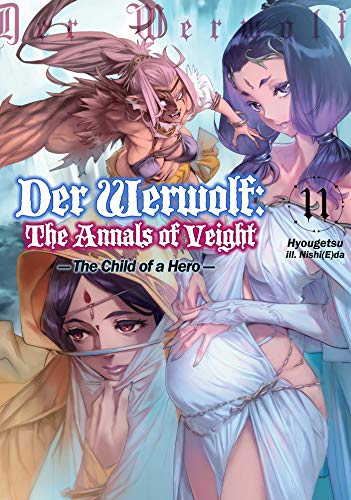By Hyougetsu and Nari Teshima. Released in Japan by Earth Star Novels. Released in North America by J-Novel Club. Translated by Ningen.
It is a question often asked by authors, and even more often by publishers: when it the right time to end a series? It can depend very much on what kind of series it is, but for a series like Der Werwolf, the last volume certainly felt like an ending. Veight and Airia were together, she’d had their child, and he was busily uniting the entire kingdom and bringing a new era of peace to all. Medetashi, medetashi. Except frequently if you try to keep doing stories after “and everyone lived happily ever after”, it tends towards “until they died and here’s how”. Fortunately, Der Werwolf may be moving on to the Next generation, but it’s not quite ready to give up on Veight, or more accurately to give up on Veight being a living legend whose only fault is his absolutely crippling humility. Something that, fortunately, does not seem to have transferred over to his daughter, though she certainly seems to have inherited his ability to find trouble.
The book takes place, with many timeskips, around the first ten years of the life of Friede, Veight and Airia’s daughter. That said, most of it is still the usual setup for this series: Veight’s POV, and then an alternate POV from another character that expounds on Veight’s greatness. (I will assume that if this sort of thing bothers you,. you dropped the series ages ago.) Veight is filled with parental love and also Japanese ideas on how to raise children, which differ a bit from “give them to childcare people and see them once a year” that this world’s nobles tend to do. Friede is also not your typical child – while she can’t transform into a werewolf, she has all of Veight’s other abilities, enough mana to level a warship, and by the end of the book is learning swordfighting, martial arts, and diplomacy. Which may be needed, as she’s packed off to the Rolmund Empire at the end of the book, as Eleora wants to meet her.
Again, the biggest flaw in this book is is irrelevance: it’s After Stories, so if you wanted to drop the series neatly, doing so just before this book starts is a perfectly good response. That said, it doesn’t really do anything wrong, and gives us more of Veight being Alexander the Great as a wolf, only with more sense. He’s still resolving disputes, still occasionally being forced to fight 20-against-1 battles, and still insisting that he’s just a humble vice-commander. In addition, as much as Veight is hoping to usher in a time of peace, there are always going to be bad guys – someone in this book is kidnapping girls from other kingdoms and has them all holed up in a house in Meraldia… which Freide promptly finds in about two seconds, which bodes well for her. She’s a fun kid, who was raised thinking her dad was a normal goofy dad, and only now finding out that everyone reveres him. Which means she’s now in the “dad is so cool!” phase of her life.
So yes, if you really do like Der Werwolf, this is a fun read, and has a nice side story about Woroy trying to start his own city and realizing that the best way to do it is by inventing rollerball. Certainly the series was popular enough to be grabbed by a larger publisher… but we don’t have to worry about that till after Vol. 13.


